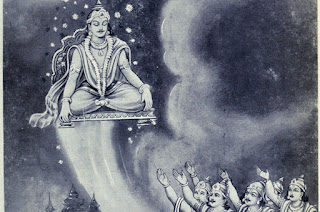There was a sage named Atri. Atri performed very difficult tapasya. So difficult was the tapasya that Atri's energy was thrown up into the sky. The sky could not bear this energy and hurled it down onto the earth. This energy then gave birth to Soma or Chandra, the moon god. Brahma took Chandra up into his chariot and drove the chariot around the earth twenty-one times. From whatever energy was left after Chandra has been created, the herbs were born.
 Chandra also performed very difficult tapasya. One padma year consists of 10,000,000,000,000 normal years. For one hundred such padma years, Chandra mediated.
Chandra also performed very difficult tapasya. One padma year consists of 10,000,000,000,000 normal years. For one hundred such padma years, Chandra mediated.
 Chandra also performed very difficult tapasya. One padma year consists of 10,000,000,000,000 normal years. For one hundred such padma years, Chandra mediated.
Chandra also performed very difficult tapasya. One padma year consists of 10,000,000,000,000 normal years. For one hundred such padma years, Chandra mediated.
After the meditation was over, Brahma appointed Chandra lord over seeds, herbs, brahmanas and the oceans. Chandra also performed a rajasuya yajna (royal sacrifice) as a celebration of his lordship. This gave him a lot pomp, glory, wealth and respect.
But all this merely served to turn Chandra's head. The guru (teacher) of the gods was the sage Brihaspati. Brihaspati had a wife named Tara and Chandra abducted Tara. Despite the gods and the sages asking Chandra to return Tara, the moon god would not listen. A terrible war then raged over Tara, the gods fighting for Chandra. Shukracharya, the guru of the demons, fought on Chandra's side and Shiva fought on Brihaspati's side. This war (Samgram) came to be known as tarakamaya samgram, since it was fought over Tara.
Finally Brahma intervened and a truce was called. But Chandra and Tara had by then had a son, and Brihaspati refused to accept this son as his own. This son was Budha. As you already known, Budha married Ila and they had a son named Pururava.
The Brahma Purana now describes several kings belonging to the lunar dynasty.
In the lunar dynasty, there was born a powerful king named Nahusha. He married Viraja and they had six sons named Yati, Yajati, Samyati, Ayati, Yati, and Suyati. Yati became a hermit. So although Yayati was not the eldest, he was crowned king after Nahusha.
Yayati had two wives. The first was Devayani, daughter of Shukracharya. And the second was Sharmishtha, daughter of Vrishaparva, the king of the danavas. Devayani had two sons named Yadu and Turvasu and Sharmishtha had three sons named Druhya, Anu and Puru. Yayati conquered the whole earth and ruled over it. When he became old, he divided the earth amongst his five sons. Yadu was given the lands to the east, Puru the lands in the center, Turvasu the lands to the south and south-east, Druhya those to the north and Anu those to the west.
Yayati gave up his weapons and decided to travel throughout the world. He called Yadu to him and said, "I wish to explore the world and my old age is a hindrance. Please accept my old age and give me your youth in return."
Yadu refused. "I will not," he said. "One cannot eat well when one is old, nor can one pleasure the comforts of the world. Old age is not pleasant. Ask one of my brothers instead." Yadu's refusal angered Yayati. He cursed Yadu that he or his descendants would never be kings. Yayati next requested Druhya, Turvasu and Anu, but they too refused and were similarly cursed by their father. But Puru agreed to his father's request and gladly accepted the old age. He was blessed by his father.
After many years had passed, Yayati got tired of the world and returned Puru's youth to him. He accepted back his old age and retired to the forest to mediate.
From Puru was descended King Bharataa after whom the land came to be known as Bharataavarsha. Also in this line was King Kuru, after whom all the descendants came to be known as Kauravas. The sacred place named Kurukshetra owes its name to King Kuru.
From Turvasu were descended the kings of Pandya, Kerala, Kola and Chola. From Druhya were descended the kings of Gandhara. The horses of the Gandhara kingdom are famous.
Yadu had five sons, Sahasrada, Payoda, Kroshtu, Nila and Anjika. Sahasrada's descendants were the Haihayas, amongst whom the most famous was Kartyavirya Arjuna. Arjuna pleased the sage Dattatreya and became invincible. He also had a thousand arms. Arjuna's greatest deeds were his defeat and imprisonment of Ravana, king of Lanks. Kroshtu's descendants were Vrishni and Andhaka and in the Vrishni line was born Krishna.



